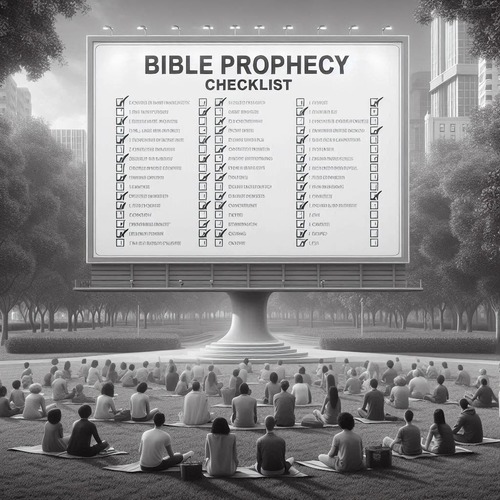Ten Astonishing Bible Prophecies Fulfilled
Vague predictions from self-proclaimed mystics don't hold a candle to the Bible's prophetic power. Nostradamus' contrived riddles stand in stark contrast to these instances of explicit, unambiguous foretelling in the pages of Scripture…
While the Old Testament's Messianic prophecies about Jesus Christ are well-known and studied in-depth (READ: Impossible Prophecies Fulfilled: Against Quintillion-to-One Odds), the Scriptures contain a treasure trove of non-Messianic prophecies that provide an equally powerful testament to their divine inspiration. These prophecies, foretelling events and details that humanly could not have been known, stand as an irrefutable stamp of God's authorship on the biblical texts. In this post, we shall explore 10 such prophecies that have been stunningly and accurately fulfilled, defying all naturalistic explanation.
The Fall of Babylon (Isaiah 13:19-22, Jeremiah 51:26)
The mighty city of Babylon, with its hanging gardens and impregnable walls, was the superpower of the ancient world. Yet the prophets Isaiah and Jeremiah dared to proclaim its utter desolation centuries before it occurred. Their words painted a chilling picture of the city lying in ruins, uninhabited for generations. Remarkably, in 539 BC, the Persian king Cyrus conquered Babylon, and the once great city fell into a state of ruin and abandonment, just as foretold.
The Destruction of Tyre (Ezekiel 26:3-5, Ezekiel 26:12)
The prosperous Phoenician city of Tyre, fortified by the sea, appeared impregnable. However, Ezekiel's prophecy declared many nations would come against it, its ruins would be cast into the sea, and it would become "a bare rock" where fishermen would spread their nets. Incredibly, this precise scenario unfolded in 332 BC when Alexander the Great demolished the city, using the rubble to build a causeway to the island fortress. Today, fishermen still spread their nets among Tyre's ruins, exactly as prophesied.
The Demise of Edom (Isaiah 34:9-10, Jeremiah 49:17-18, Obadiah 1:18)
The nation of Edom, descended from Esau, faced a dire prophecy from Isaiah, Jeremiah, and Obadiah—its land would become a perpetual desolation, utterly uninhabited. By the 6th century BC, the Babylonians and later the Nabateans devastated Edom, leaving its once-thriving land barren and deserted, precisely fulfilling the prophetic words.
The Downfall of Nineveh (Nahum 3:7, Nahum 3:18-19)
The Assyrian capital of Nineveh, mighty and cruel, appeared invincible. Yet Nahum foretold its utter ruin, declaring, "all who see you will flee from you" and "there is no healing for your wound." In 612 BC, a coalition of Babylonians, Medes, and Scythians brought about Nineveh's catastrophic destruction, its ruins lying buried until their rediscovery centuries later—a chilling confirmation of Nahum's prophecy.
Egypt's Diminished Glory (Ezekiel 29:15, Isaiah 19:1-4)
The prophets Ezekiel and Isaiah foresaw the decline of Egypt, once a dominant empire, declaring it would become "the lowliest of kingdoms" and never again rule over nations. Through a series of conquests by the Assyrians, Persians, Greeks, and Romans, Egypt's power waned, and today, while still a significant nation, it is far from the superpower it once was, just as the prophets foretold.
The Restoration of Jerusalem (Jeremiah 31:38-40, Isaiah 44:28)
Amidst the devastation of Jerusalem, the prophets Jeremiah and Isaiah proclaimed the city would be rebuilt, with Isaiah even naming the Persian king Cyrus as the one who would decree its restoration. Remarkably, after the Babylonian exile, Cyrus issued the very decree that allowed the Jews to return and rebuild Jerusalem, fulfilling the prophecy made over a century earlier.
The Fall of Samaria (Hosea 13:16, Amos 3:11)
The capital of the northern kingdom of Israel, Samaria, faced a grim prophecy from Hosea and Amos—its people would "fall by the sword," its pregnant women "ripped open," and its strongholds plundered. In 722 BC, the Assyrian Empire conquered Samaria, exiling many Israelites and repopulating the area, bringing about the fulfilment of these dire predictions.
The Destruction of Moab (Jeremiah 48:4-8, Isaiah 15:1)
The neighbouring nation of Moab was the subject of prophecies by Jeremiah and Isaiah, who declared it would be "destroyed as a nation." In the 6th century BC, the Babylonians conquered Moab, and the once-independent nation ceased to exist, confirming the prophetic words.
The Fate of Philistia (Zephaniah 2:4-5, Amos 1:8)
The prophets Zephaniah and Amos foretold the destruction of Philistia and its major cities, with Zephaniah declaring, "I will destroy you, and none will be left." By the 7th century BC, the Philistine cities were indeed demolished, and their people assimilated into surrounding cultures, especially after the Assyrian and Babylonian conquests, ultimately disappearing from history as a distinct people, just as prophesied.
The Ruin of Thebes and Memphis (Ezekiel 30:13-16, Jeremiah 46:19)
The Egyptian cities of Thebes and Memphis, once centres of power, faced prophecies of ruin from Ezekiel and Jeremiah. These prophecies were fulfilled as the cities fell into decline and desolation, with the Assyrians, Persians, Greeks, and Romans contributing to their destruction over time. Today, their ruins stand as silent witnesses to the accuracy of these biblical prophecies.
Conclusion: These 10 non-Messianic prophecies, spanning centuries and covering a wide range of nations and events, have been fulfilled with astonishing precision. The odds of such accuracy occurring by mere chance or human speculation are infinitesimally small. Instead, these prophecies stand as a resounding affirmation of the Bible's divine inspiration and the omniscience of its Author.
For believers, these fulfilled prophecies fortify our faith, reminding us we can trust the Scriptures are the very word of God. For sceptics and seekers, these prophecies demand an honest reckoning—how can such incredible foresight be explained apart from divine revelation? The choice before us is clear: either embrace the compelling evidence of the Bible's supernatural origin or cling to an increasingly untenable position of naturalistic denial.
The fulfilment of these prophecies echoes the words of Isaiah 46:9-10: "I am God, and there is no other; I am God, and there is none like me. I make known the end from the beginning, from ancient times, what is still to come." Let us approach the Scriptures with open hearts and minds, allowing the weight of these fulfilled prophecies to lead us to the ultimate Author, the sovereign Lord who holds the past, present, and future in His hands.
Related Reads:
Editor's Pick

‘What Sorrow Awaits You Who Are Rich…’: What Does Jesus Mean?
The words hang in the air like a sword over comfortable Christianity: “What sorrow awaits you who are rich, for [...]

Does the Bible Clearly Teach the Deity of Christ?
Critics argue Jesus never explicitly claimed to be God. Others suggest the doctrine emerged centuries later through philosophical speculation. But [...]

The Holy Spirit’s Indwelling: How Can I Be Sure I Have It?
“Am I truly saved? How can I know for certain that the Holy Spirit lives within me?” If you’ve wrestled [...]

Did Mary Remain a Virgin? A Biblical Case Against Perpetual Virginity
The question of Mary’s perpetual virginity has divided Christians for centuries. While Catholic and Orthodox traditions affirm Mary remained a [...]

Is Occam’s Razor a Compelling Argument Against Theism?
WHY THE ARGUMENT ACTUALLY POINTS TO GOD Picture this: You're in a coffee shop debate with a confident sceptic [...]

Is the Doctrine of Justification in the Old Testament?
WAS PAUL INVENTING SOMETHING NEW OR REVEALING SOMETHING ANCIENT? Picture this scene: You’re discussing faith with a thoughtful sceptic who [...]

How God Reveals Himself to Us: General and Special Revelation
Every human heart carries an undeniable longing to know ultimate truth—to understand our place in the universe and the longing [...]

Doctrine of God and Bible Interpretation: Are The Two Connected?
Picture this: Two seasoned pastors read the same verse about God's sovereignty and human responsibility. One concludes God determines all [...]

What Did Jesus Mean: ‘I Bring Not Peace But a Sword’?
Jesus’ statement may sound perplexing to us at first read: "Do not think that I have come to bring peace [...]

The Beatitudes: The Nine Marks of Those Jesus Calls Blessed
When Jesus climbed that hillside in Galilee and began to speak, He turned the world's understanding of blessing upside down. [...]
SUPPORT US:
Feel the Holy Spirit's gentle nudge to partner with us?
Donate Online:
Account Name: TRUTHS TO DIE FOR FOUNDATION
Account Number: 10243565459
Bank IFSC: IDFB0043391
Bank Name: IDFC FIRST BANK






